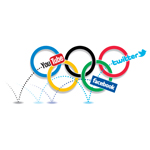
The popularity explosion of social media networks offer huge opportunities to the International Olympic Committee (IOC) where millions of fans around the world on Facebook and Twitter will give their reactions to the game. Revenues for social media on the Olympics is very much dependent on the billion-dollar deals agreed with broadcasters and sponsors.
The 2012 Olympics in London are being touted by some as the world’s "first social Games." While some question aroused, there is no doubt that social media networks such as Facebook, Twitter and YouTube will play an important role in how information is disseminated from London, and how the global sports conversation is driven during July and August.
Head of media operations for the IOC, Anthony Edgar, freely admits that he does not know what to expect in the London Olympics following the explosion of social media, with almost a billion people using Facebook in 2012 compared to the slightly above 100 million people who used the site four years ago at the time of the Beijing Games.
"We're having to deal with things that didn't exist in Beijing."
The Big Three
When it comes to social networking, the choices are almost limitless. Below is a list of the biggest and the most popular social media network today, and how they were in Beijing Games.
2008: In August 2008, from then-Facebook executive and eventual Path co-founder, Dave Morin, announced the celebration for Facebook in breaking the 100 million user threshold.
Today: Facebook claims to have more than 900 million users. Facebook is becoming a portal to the web at large for many and is a publicly traded company.
2008: The year ended with 6 million registered users who sent about 300,000 tweets per day. The social network was still very young and its users were very much finding their way.
Today: Twitter currently claims more than 500 million users who collectively send over 400 million tweets each and every day. Twitter has become one of the most aimed media for prime and viral marketing.
YouTube
2008: YouTube users were uploading 10 hours of video to the site per minute. It launched its mobile site, pre-roll ads and 720p HD option.
Today: The company says it receives over 800 million unique visitors per month. Those visitors watch more than 3 billion hours of video per month and upload 72 hours of new video content per minute. Five hundred years’ worth of YouTube video are watched on Facebook every day and more than 700 YouTube videos get shared on Twitter each minute.
Aiming for the Young Audience
Ian Maude, an analyst in online media, said that it is a challenge to the social media networks and IOC as many fans will not know the rules. "I think there will be an issue with people not realizing the rules but also some people could think about how much they've paid for those tickets and they may not care about the rules anyway."
"These days, everyone has a mobile phone, which doubles as a video camera. With it, people are going to record the moments," he said.
A spokeswoman for Facebook said the group had a close relationship with the London organizers and would respond to any IP violations in the same way they do with other events.
Edgar said the social networks could enable its media partners to reach a younger audience who are spending less time in front of the television, while the IOC will work closely with the social media sites in cases where unofficial content hits those sites. Since social media has become the source of news for many younger generation, this case will definitely happen.
In its official site, the IOC has announced its social media, blogging and internet guidelines for participants and other accredited persons at the London 2012 Olympic Games.
Tim Berners-Lee, the inventor of the World Wide Web, was greeted on the opening ceremony of the London Olympic Games celebrated his work. As social media becomes part of everyday life, the Olympics organizers' decision to honor Berners-Lee placed the digital revolution he helped spark on a level with the Industrial Revolution in changing ordinary lives.